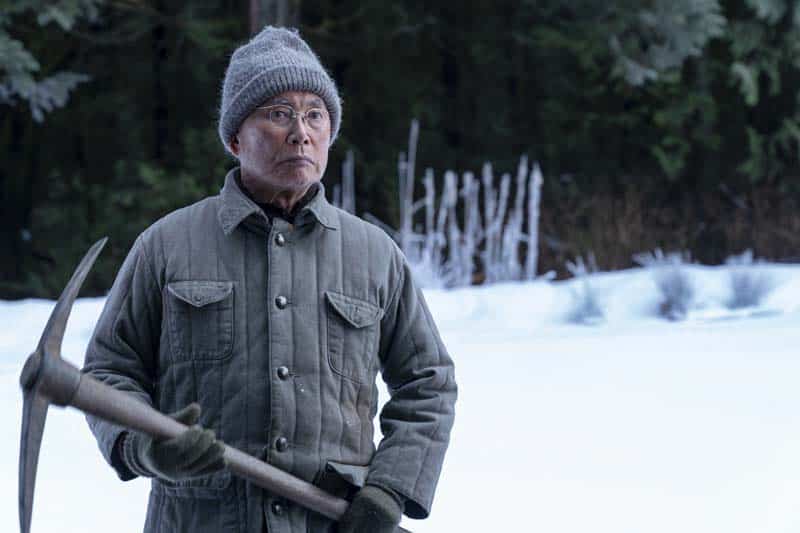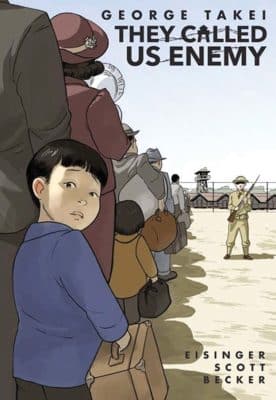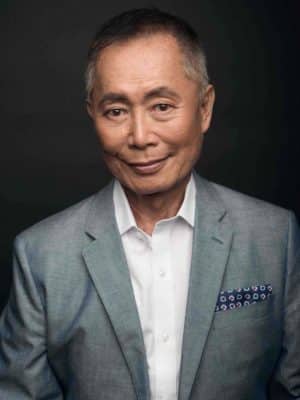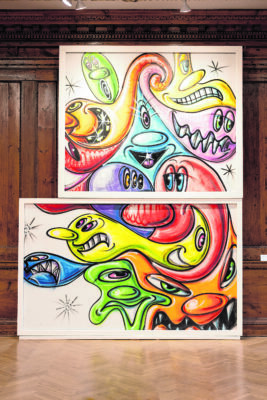Star Trek actor shares childhood experiences in The Terror: Infamy

George Takei is calling 2019 his “Summer of Internment.” As someone who was imprisoned as a child with his family in U.S.-run internment camps during World War II, his lifelong passion about educating people about this shameful chapter in American history has fresh legs, due, in part, to a pair of projects he is currently involved with. The first is The Terror: Infamy, the latest installment of the AMC horror drama anthology that is set in the same kind of camp Takei and his family were interned in. The second is They Called Us Enemy, a graphic novel that recounts Takei’s childhood experience in those American concentration camps. Interestingly enough, the Los Angeles native’s involvement with this 10-episode series came about via one of the many lectures he’s made over the past four decades about the internment of Japanese-American citizens.
“I guess it was about 20 years ago that I spoke at Occidental College, here in Los Angeles. In that class was a guy named Max Borenstein, who is now one of the executive producers at AMC. When they were brainstorming for a concept for the second edition of The Terror, he said he was a student at Occidental [back then and] he heard a speech about the internment of Japanese-Americans from George Takei. It was a horrific experience and he pitched it at the network,” the actor explained.
“That grew into this project The Terror: Infamy. Alex Woo was assigned to be the show runner for the show and he called one day to say he had an interesting project that he wanted to come over and talk to me about. When I asked him what it was about, he said it was about the internment of Japanese-Americans. I said of course—that’s my mission in life. So he came over and sat in my living room and described the project and I said this was very important.”
While this series is steeped in Japanese supernatural folklore, much of the first-hand details are shaped with Takei’s help, who supplements his role as Yamato-san, the oldest internee, as a show consultant. His advice has ranged from some of the more true-life incidents that happened at these camps including a mandatory loyalty questionnaire issued by the United States government, and the details of the living quarters to the degree of wear-and-tear that was found on the plates the imprisoned were forced to eat off of.
“Writers might define metaphor and other symbolic objects. I thought it might inspire them. When we got into filming, I was there to say this was authentic and true or that needs to be tweaked a little bit,” he explained. “The very sturdy ceramic plates that they had in the mess hall were straight from Bed, Bath & Beyond and were brand new. My memory is that of dining off of used-up, often-dropped, washed roughly, chipped-up and sometimes cracked crockery. So I was there to make these little details authentic.”
The oldest of three children, Takei was born on April 20, 1937, in Los Angeles, CA, to Japanese-American parents Fumiko Emily (née Nakamura; born in Sacramento, CA) and Takekuma Norman Takei (born in Japan’s Yamanashi Prefecture). In 1942, the Takei family was forced to live in the converted horse stables of Santa Anita Park. They were later transferred to the Rohwer War Relocation Center for internment in Rohwer, AR, before being sent back west to the Tule Lake War Relocation Center in California.
As a child, Takei was “…going on an adventure of discovery in the swamps of Arkansas—bayous, tadpoles that turn into frogs—it was a magical experience for me.” At the same time, he was unaware of the harrowing experience his parents were going through, thanks to FDR’s Executive Order 9066, which authorized the secretary of war to incarcerate Japanese Americans in U.S. concentration camps. The order was signed on Feb. 19, 1942 (referred to by Japanese-Americans as the “Day of Remembrance”) following the attack on Pearl Harbor on Dec. 7, 1941. Approximately 112,000 men, women, and children of Japanese ancestry were evicted from the West Coast of the United States and held in confinement sites across the country. While blissfully unaware of what was going on during this four-year stretch of his childhood, the willingness of Takei’s father to discuss what happened and his teenage son’s delving into American history sparked plenty of arguments and stoked the future actor’s passion about this topic.
“I had African-American friends and was involved in the Civil Rights movement inspired by speeches of Dr. Martin Luther King, Jr. I also read civics books and the noble ideals of democracy—All men are created equal; equal justice under the law; this is a nation ruled by law. In our case, there were no charges and no trial. The central pillar of our justice system—due process—simply disappeared,” he said. “There was outrage upon an outrage. The very fact that the American government stripped us of everything. We lost our business. Our bank account was frozen and therefore we couldn’t pay the mortgage, so the home was lost. We were stripped naked. And then they imprisoned us with no charges. We were innocent people who had nothing to do with Pearl Harbor and we were imprisoned.”

His righteous indignation over these events also found him starring in the 2015 Broadway musical Allegiance, a self-described passion project based on Takei’s personal internment camp experience. Nearly five years later, he sees the same degree of xenophobia and denigration of the other rearing its ugly head again, which is why he feels The Terror: Infamy and his graphic novel, They Call Us Enemy, are so relevant today.
“I’m always shocked when I’m talking with people that I consider well informed about my childhood imprisonment and they are shocked. I’m shocked that they’re shocked and don’t know about this critical chapter of American history,” he said. “That’s why these current projects of mine are so important. We are living through a time like that right now. In my case, I was a child and we were intact as a family. The same sweeping statement that Trump has been making about the Latinos—they’re drug dealers, rapists and murderers—it’s not unlike the stereotyping of Japanese-Americans that was going on during the Second World War. We’re currently living through The Terror: The Infamy. The third season should be about the Trump Administration.”
The Terror: Infamy airs on AMC. Check local listings for times.





















